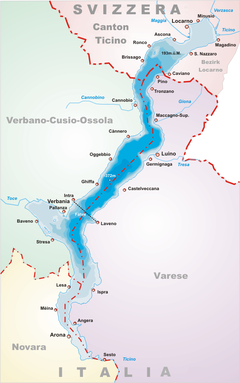Lake Maggiore
|
Lago Maggiore Verbano Lake Maggiore |
|
|---|---|

View of Lake Maggiore towards the Alps and Monte Rosa from above Laveno
|
|
 |
|
| Location |
Lombardy and Piedmont, Italy Ticino, Switzerland |
| Coordinates | 46°11′N 8°50′E / 46.183°N 8.833°ECoordinates: 46°11′N 8°50′E / 46.183°N 8.833°E |
| Primary inflows | Ticino, Maggia, , Tresa |
| Primary outflows | Ticino |
| Catchment area | 6,599 km2 (2,548 sq mi) |
| Basin countries | Italy, Switzerland |
| Max. length | 64.37 km (40.00 mi) |
| Max. width | 10 km (6.2 mi) |
| Surface area | 212.5 km2 (82.0 sq mi) |
| Average depth | 177.4 m (582 ft) |
| Max. depth | 372 m (1,220 ft) |
| Water volume | 37 km3 (8.9 cu mi) |
| Residence time | 4 years |
| Surface elevation | 193 m (633 ft) |
| Islands | Brissago Islands, Borromean Islands |
| Settlements |
Locarno, Luino, Verbania, Arona (see list) |
Lake Maggiore (Italian: Lago Maggiore, pronounced [ˈlaːɡo madˈdʒoːre] literally 'Greater Lake') or Lago Verbano ([verˈbaːno]; Latin: Lacus Verbanus) is a large lake located on the south side of the Alps. It is the second largest lake in Italy and the largest in southern Switzerland. The lake and its shoreline are divided between the Italian regions of Piedmont and Lombardy and the Swiss canton of Ticino. Located halfway between Lake Orta and Lake Lugano, Lake Maggiore extends for about 65 kilometres (40 miles) between Locarno and Arona.
The climate is mild in both summer and winter, producing Mediterranean vegetation, with many gardens growing rare and exotic plants. Well-known gardens include those of the Borromean and Brissago Islands, that of the Villa Taranto in Verbania, and the Alpinia botanical garden above Stresa.
Lake Maggiore is 64.37 km (40 mi) long, and 3 to 5 km (2 to 3 mi) wide, except at the bay opening westward between Pallanza and Stresa, where it is 10 km (6 mi) wide. It is the longest Italian lake, although Lake Garda has a greater area. Its mean height above the sea level is 193 metres; a deep lake, its bottom is almost everywhere below sea-level: at its deepest, 179 metres below. Its form is very sinuous, so that there are few points from which any considerable part of its surface can be seen at a single glance. If this lessens the effect of the apparent size, it increases the variety of its scenery. While the upper end is completely alpine in character, the middle region lies between hills of gentler form, and the lower end advances to the verge of the plain of Lombardy. Lake Maggiore is the most westerly of the three great southern prealpine lakes, the others being Lake Como and Lake Garda.
...
Wikipedia
